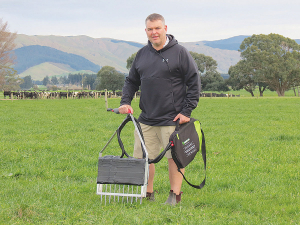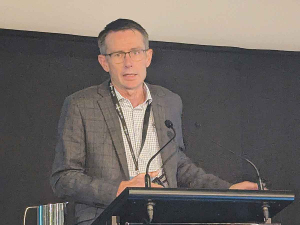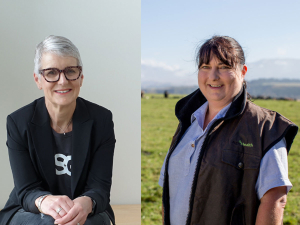Measuring the actual damage caused by pugging on farms is notoriously difficult, says Massey soil scientist Dr Dave Horne.
But as Peter Burke reports, Horne and his colleagues have developed a research tool to help them do this.
For many years Massey scientists have worked to get science behind the management of wet winter pastures that affect dairy farmers. Much of their research has been done at the Number 4 Massey Dairy farm on the outskirts of Palmerston North where a free-stall barn (herd home) has been built as part of an extensive research programme.
This work was done in the wider context of Pastoral 21, funded by MBIE, DairyNZ, Fonterra, Beef + Lamb NZ and Dairy Companies Association of NZ. The overall aim was to see if production could be increased by improved pasture growth and utilisation while reducing nutrient losses to the environment.
Horne says the trial compared the use of the free-stall barn to a modern dairy farm equipped with a feed pad, with the aim of seeing which system worked best by taking cows off the pasture. They deliberately went for a relatively high spec dairy farm with a feed pad, rather than one without this facility, as this is current ‘good practice’.
“We were taking pasture and soil protection to a level beyond just standard farm management. The standard farm had a feed pad so they were in a position to practise on-off grazing. But the limitation of these systems is that you more or less have to go out to the grass every day because the cows can’t stand 24 hours on a standard feed pad. But with the free-stall barn we were able to keep the cows off all day or multiple days depending on conditions.”
The trial hasn’t been without challenges: in two of the three years the winters were dry but the final year saw the wet arrive.
What surprised Horne and other scientists when drawing comparisons between the use of the free-stall barn and the farm with the feed pad was that over the season the pastures on both farms fared about the same -- no more and no less annual pasture growth.
This was due in part to the common practice of planting summer crops in paddocks with the worst pugging damage . But it became clear that having a quality stand-off area makes a difference to pasture utilisation and production in early lactation.
Part of the trial at No 4 Dairy was to find ways for farmers to tell when and when not to graze their animals and for how long. To this end they ran a series of trials based on grazing cows on pastures with different soil moisture levels. Horne says it’s widely known that soil with a larger moisture deficit is suitable for grazing and that minimal damage will occur. But they wanted to get more information.
“We wanted to identify what moisture content we could safely graze at so we had four different treatments. These ranged from a saturated soil that had limited time to dry out through to grazing when the soil moisture deficit was greater than 4mm.
“We then grazed the cows on these trial plots for either four or eight hours and at the same time tracked soil damage and pasture production. This is relatively challenging research to manage especially on small (30 x 20m) plots and we have now done two years work.
“The objective is to develop a protocol here that farmers can follow based on the soil moisture deficit,” he says.










